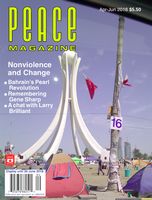
Peace Magazine Apr-Jun 2018, page 2. Some rights reserved.
Search for other articles by peacemag here
In Salisbury, England on March 4, Sergei Skripal, 66, and his 33-year-old daughter Yulia were attacked with Novichok, a chemical agent developed by the Soviet Union. They remain in critical condition. The chemical interferes with nerves and leads to respiratory and cardiac arrest.
Skripal had been a Russian military spy who became a double agent for Britain. After being jailed four years, he was exchanged in 2010 in a spy-swap with Britain, where he currently lives.
Yulia Skripal had arrived only the day before from Moscow, where she was working in the US Embassy. She had an on-and-off relationship with an alleged Russian secret service agent whom she had not introduced to her friends, according to Komsomolskaya Pravda. Her photos of him and her family on social media had been removed recently.
Other Moscow sources said that the mother of Yulia’s boyfriend was a high level security service agent who was furious that her son was dating the daughter of a traitor. Some members of Yulia’s family speculate that the real target of the assassination attempt may not have been the father, as generally supposed, but rather the daughter or both.
Other speculations are running rife as to the motive. The leading theory calls the attack a signal to other Russians that they will be punished for defecting, wherever they try to hide. It is not by chance that the chemical is so obviously of Russian origin; it was chosen to send a clear warning.
Another theory holds that the attack was a message to Russia, where a week later the presidential election would be held. Putin’s popularity hovers around 80 percent so he would be returned to office without even rigging the election. However, he likes to show his toughness, and indeed the voters seem to admire it.
Everyone seems to have a different explanation for the attack, but few theories attribute it to anyone but Vladimir Putin. The Organization for the Prohibition of Chemical Weapons has accumulated massive technical evidence after inspecting the destruction of 70,000 tonnes of chemical weapons from eight different states. Every chemical weapon inherently has a “signature” that reveals its source, based on the fact that each producer of a given chemical will make it in a different way from all other producers. Britain asserts with high confidence that this Novichok was from Russia and, although Russian officials deny it, the evidence is so compelling that France, Germany, and even Donald Trump’s US government jointly condemned Russia for its “assault on UK sovereignty.”
Prime Minister Theresa May said, “Either this was a direct act by the Russian state against our country, or the Russian government lost control of this potentially catastrophically damaging nerve agent and allowed it to get into the hands of others.”
The Chemical Weapons Convention, of which both Russia and Britain are signatories, prohibits the use of toxic chemicals such as nerve agents except for a few specifically described purposes. If a nerve agent is kept by a state for any other purpose, that is a violation.
Russia announced recently that it had destroyed its entire stockpile of chemical weapons, but Novichok was not listed among them. There is no official list of banned chemical weapons, but OPCW does list the ones they monitor for verification purposes. However, all other chemicals also are illegal for use as weapons.
Chemical weapons experts worry about this violation of a treaty by one of its signatory states. Every such violation of a global norm erodes the confidence in all arms control and disarmament treaties by creating an impression that the international community is powerless to prevent or punish future violations. This would make states even less likely than now to sign the Treaty on the Prohibition of Nuclear Weapons.
Sources: L.V. Anderson in Digg, Mar. 12, 2018; Nick Parker, March 18, 2018; and Pugwash correspondents.On February 2 the United States released a Nuclear Posture Review. At immense cost it seeks to make nuclear war more “thinkable, practical, and winnable,” including deploying new low-yield systems. These blur the lines between conventional and nuclear conflict and lower the threshold at which their use becomes “acceptable.”
The Trump review was drafted by a team of hawks under the supervision of Defense Secretary James Mattis. It flatly rejects the conclusion drawn long ago by Ronald Reagan and Mikhail Gorbachev that “a nuclear war cannot be won and must never be fought.”
Source: Sean Howard, Cape Breton, Nova Scotia
Peace Magazine Apr-Jun 2018, page 2. Some rights reserved.
Search for other articles by peacemag here